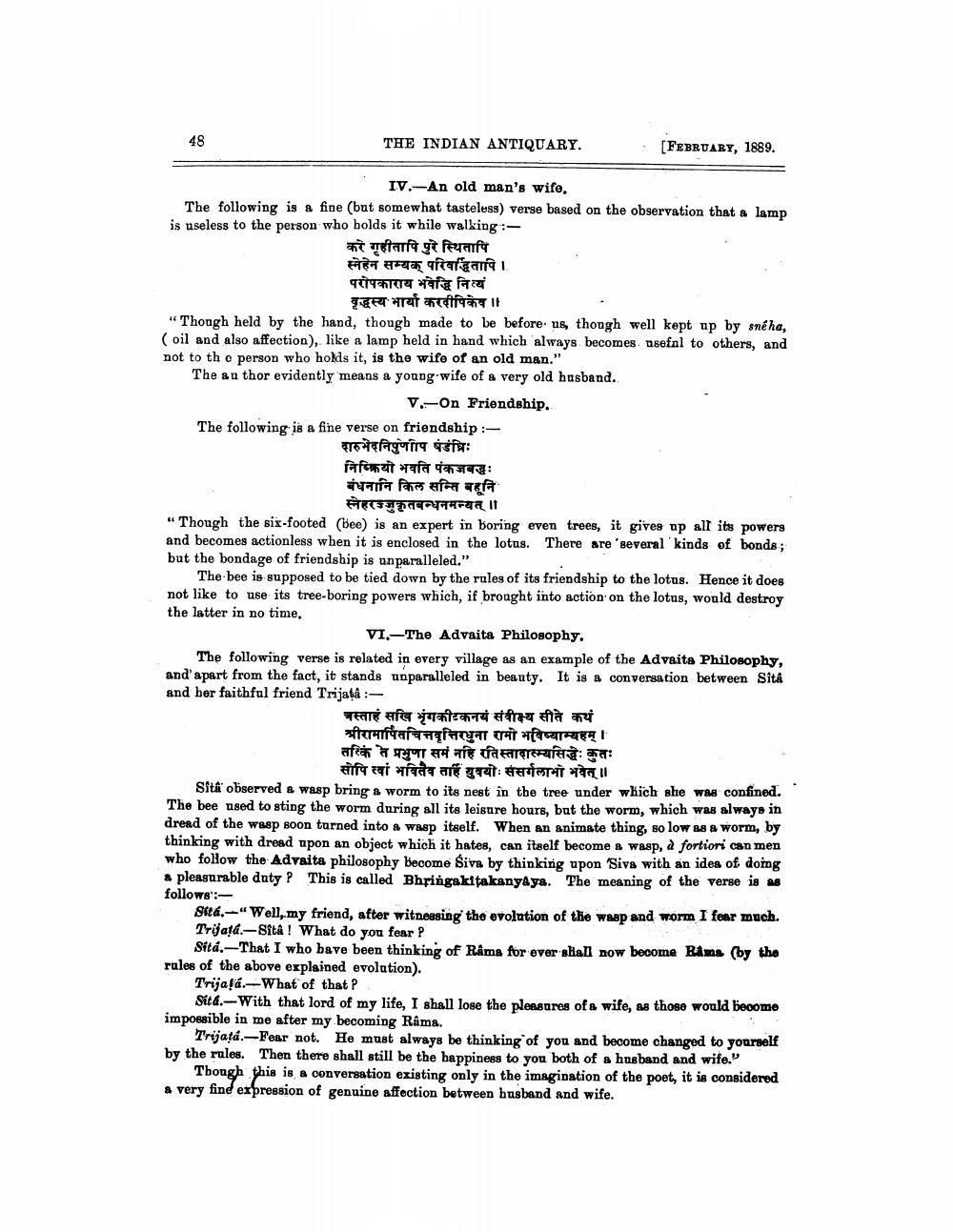________________
THE INDIAN ANTIQUARY.
[FEBRUARY, 1889.
IV.-An old man's wife, The following is a fine (but somewhat tasteless) verse based on the observation that a lamp is useless to the person who bolds it while walking :
करे गृहीतापि पुरे स्थितापि स्नेहेन सम्यक् परिवर्द्धितापि । परोपकाराय भवेद्धि नित्यं
वृद्धस्य भार्या करदीपिकैव ।। "Though held by the hand, though made to be before us, though well kept up by snéha, ( oil and also affection), like a lamp held in hand which always becomes zsefnl to others, and not to th o person who holds it, is the wife of an old man." The author evidently means a young wife of a very old husband.
V.-On Friendship. The following is a fine verse on friendship :
दारुभेदनिपुणीप पंडंत्रिः निष्क्रियो भवति पंकजबद्धः बंधनानि किल सन्ति बहूनि
स्नेहरज्जुकृतबन्धनमन्यत् ॥ " Though the six-footed (bee) is an expert in boring even trees, it gives up all its powers and becomes actionless when it is enclosed in the lotus. There are several kinds of bonds; but the bondage of friendship is unparalleled."
The bee is supposed to be tied down by the rules of its friendship to the lotus. Hence it does not like to use its tree-boring powers which, if brought into action on the lotus, would destroy the latter in no time.
VI.-The Advaita Philosophy. The following verse is related in every village as an example of the Advaita Philosophy, and' apart from the fact, it stands unparalleled in beauty. It is a conversation between Sitâ and her faithful friend Trijata :
वस्ताहं सखि भंगकीटकनयं संवीक्ष्य सीते कथं श्रीरामार्पितचित्तवृत्तिरधुना रामी भविष्याम्यहम् । तत्किं ते प्रभुणा समं नहि रतिस्तादात्म्यसिद्धेः कुतः
सोपि त्वां भवितैव तार्ह युवयोः संसर्गलाभो भवेत् ॥ Sita observed a wasp bring a worm to its nest in the tree under which she was confined. The bee used to sting the worm during all its leisure hours, but the worm, which was always in drend of the Wasp boon turned into a wasp itself. When an animate thing, so low 88 a worm, by thinking with dread upon an object which it hates, can itself become a wasp, a fortiori can men who follow the Advaita philosophy become siva by thinking upon Siva with an idea of doing a pleasurable daty ? This is called Bhfingakitakanyaya. The meaning of the verse is as follows:
Stta.--"Well, my friend, after witnessing the evolution of the wasp and worm I fear much. Trijatá.—Sita! What do you fear P
Sitá.-That I who have been thinking of Råma for ever shall now become Rama (by the rules of the above explained evolution).
Trijatá.--What of that?
Sita.-With that lord of my life, I shall lose the pleasures of a wife, as those would become impossible in me after my becoming Rama.
Trijatá.-Fear not. He must always be thinking of you and become changed to yourself by the rules. Then there shall still be the happiness to you both of a husband and wife."
Though this is a conversation existing only in the imagination of the poet, it is considered a very find expression of genuine affection between husband and wife.




